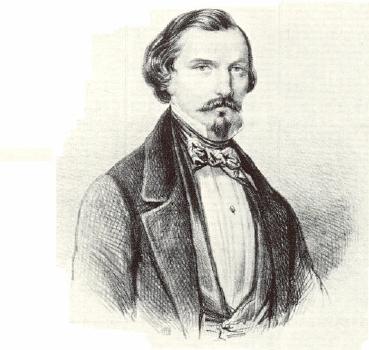 |
 |
from an hand written note found in a folder on Naudin
|
The evening's honors went to the tenor Naudin, the lion of the season, as Madame Patti is the lioness. Naudin said with suavity the aria "La mia letizia infondere" and his fourth act cantabile "In cielo benedetto". Le ménestrel, 18 January 1863
(...) The major attraction of the evening was (...) the cav. Emilio Naudin. He has based his reputation from triumphs obtained all over Europe, was, I believe, singing for the first time in Parma. He sang the Eléazar's aria from Halévy's La Juive, an old aria from Mozart's Così fan tutte, and a tender romance. (...) Pour "la bonne bouche", signora Virginia Ferni and cav. Emilio Naudin sang a suave romanza da camera "Mira la bianca luna" (...) The public went directly into rapture and demanded and obtained the bis. (...) Cav. Naudin was presented with a wreath of laurels and a honorific diploma with a medal. Il mondo artistico, 19 June 1880 |
|
The arts are poorer these days as they lost two of their old and famous champions. Emilio Naudin, born in Parma on October 21st 1823, composed at 13 years old a hymn "alla vergine" and "un motivo per litanie". He studied medicine, but attracted by music, he went to Milan. There he studied with the famous maestro Panizza. After two years, he made his debut at Cremona in Saffo with great success. After that, it was a series of triumphs and he was applauded in particular in the major theaters in Russia, England, and France. In Paris, Naudin was Rossini's favorite, who wanted him to sing every week during his famous musical soirees. Verdi said he was incomparable for the elegance of his singing and his exquisite dramatic emotion. Meyerbeer heard him one evening singing, Salle Ventadour, the romance from Cosi fan tutte "Un'aura amorosa"; he was so impressed that he chose him to be the creator of Vasco di Gama in L'africana. Naudin sang during the opening of the Suez Canal at the Teatro Vicereale in Cairo in Rigoletto. He is still remembered for his triumphs in Ebrea and Fra Diavolo. He retired form the art, because of a terrible and incurable illness, unconscious of it; he spent his last days in Bologna with the tenor Corsi, father of the artist Emilia Corsi. newspaper clipping hand dated 9 May 1890 |